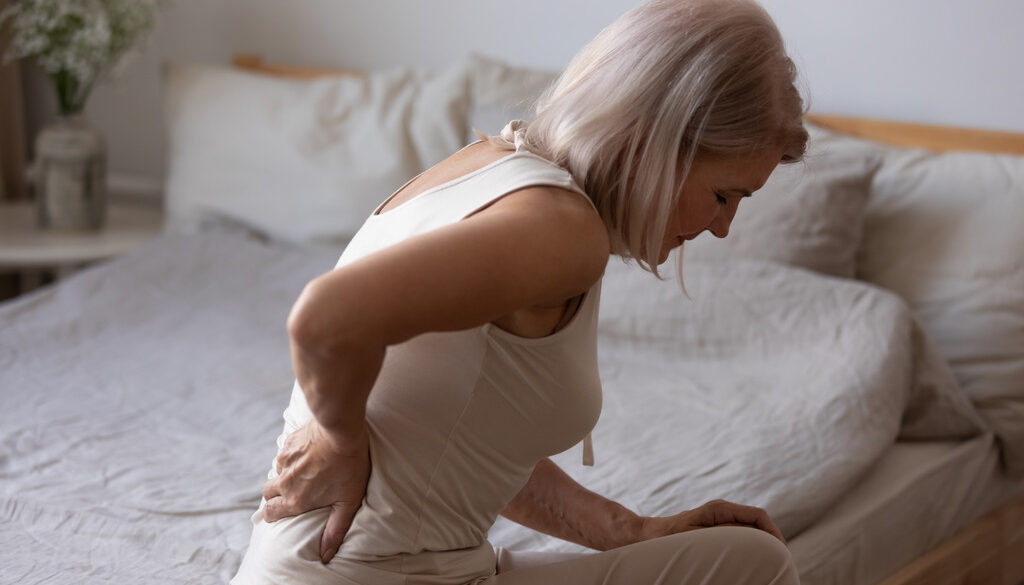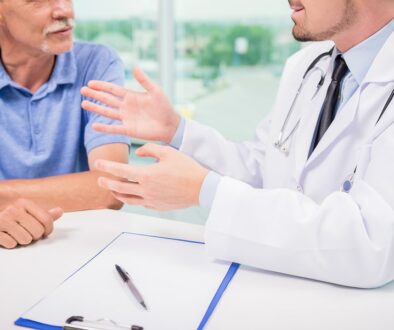How to Prevent Osteoporosis After Menopause: 5 Ways
In this article:
It’s hard to believe that one large cough can lead to devastating consequences. Still, for the millions of Americans with osteoporosis, even simple tasks like coughing or bending over can place them at greater risk for serious bone fractures. Women after menopause are at a particularly high risk, so we’re examining how to prevent osteoporosis after menopause.
Osteoporosis is a disease that causes brittle, weak bones. As a result, they’re more susceptible to fractures even from minor stressors. While it affects both men and women, it’s most often found in women who are past menopause.
At Raleigh Medical Group, we offer the care you need to detect osteoporosis early through bone density scans. Once we determine your overall bone health, we’ll create a personalized plan for you. If you’re in menopause and are concerned about osteoporosis, we encourage you to contact us today for an appointment.
We’ll discuss the common causes of osteoporosis, what treatments are available, and most importantly, how to prevent osteoporosis after menopause.
5 Ways to Prevent Osteoporosis After Menopause
1. Getting Regular Exercise
Weight-bearing physical activity, along with exercises that improve balance, can strengthen your bones and reduce the chance of fractures. We believe regular exercise should be a part of a healthy lifestyle, and we’ll be happy to help you get started.
2. Eating a Healthy Diet
Foods rich in calcium and Vitamin D are vital for your bone health. Our dietitian, Nicole Matala, will be happy to help you customize a healthy and flavorful menu to fit your needs.
3. Quitting Smoking
Study after study has demonstrated the devastating effect of smoking on your health. Smoking restricts the blood flow that is essential to healing, and could impact the healing of a fracture. It also restricts the body’s ability to absorb calcium, which is critical to building strong bones.
Vaping is not a safer alternative, as it presents some serious health issues as well. Ready to quit smoking? The Centers for Disease Control offers some valuable resources to help you.
4. Limiting Alcohol
Excessive alcohol use increases the risk of developing osteoporosis, so moderation is essential. Excessive alcohol intake can also lead to balance issues, which increases the risk of falls and subsequent fracture.
5. Having Regular Medical Checkups
By meeting regularly with our internal medicine physicians in Raleigh, you learn more about how to prevent osteoporosis after menopause. A part of this may involve supplements if you’re not getting the nutrients you need from your diet.
Why Does Menopause Place You at Greater Risk for Osteoporosis?
Estrogen helps maintain bone density. Because estrogen levels decrease during menopause, women in this age group are at greater risk for osteoporosis. Estrogen also affects the body’s ability to absorb calcium, a nutrient that is vital for bone health. Post-menopause, the body may absorb less calcium from the diet, which can negatively impact bone strength.
Who Is At Risk for Developing Osteoporosis?
Several factors can increase your risk of developing osteoporosis:
How Common Is Osteoporosis?
Osteoporosis is very common, affecting roughly 1 in 5 women aged 50 and over. While it is much more prevalent in women, it still affects men. An estimated 1 in 20 men aged 50 and over has osteoporosis, according to information from the Centers for Disease Control.
What Types of Treatments Are Available for Osteoporosis?
How to prevent osteoporosis after menopause involves following the informational points listed above. But what if you’ve already been diagnosed with osteoporosis? There are still effective treatments available.
These include medications such as bisphosphonates, denosumab, and bone-building drugs such as Teriparatide, Abaloparatide, and Romosozumab.
These medications work by either reducing the rate at which bones break down or by speeding up the bone-building process. In certain cases, estrogen hormone replacement therapy may be appropriate, but this needs to be decided on an individual basis.
Can You Rebuild Bone Density After Menopause?
Yes, it is possible. It requires a regimen of proper nutrition, effective supplements, and regular exercise, including weight-bearing exercises. If you’re interested in building your bone density, speak with one of our internists in Raleigh. We’ll create a plan to help you maintain your bone health.
Can I Increase Bone Density After 50?
Yes, it’s possible by following the steps outlined above. Medical interventions such as supplements and medications can also be used to help.
Can Vitamin D Reverse Osteoporosis?
Vitamin D is crucial in maintaining bone health and works with calcium to prevent further bone damage. However, Vitamin D alone will not reverse osteoporosis.
Concerned About How to Prevent Osteoporosis After Menopause? Let the Internal Medicine Physicians at Raleigh Medical Group Help
Our team of experts has extensive experience in helping women live their healthiest lives, providing regular screenings like Pap smears and assistance with birth control and hormone replacement therapy.
Our team of experts will help you with tailored treatments and preventive strategies suited to your individual needs. Your health and well-being are our priority. Schedule an appointment with us and take a step towards stronger, healthier bones for life.




